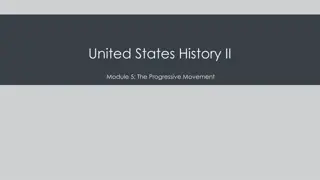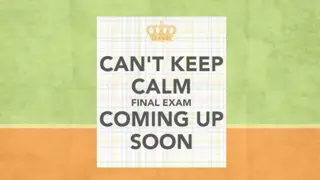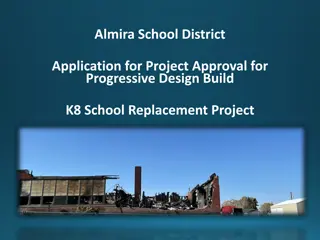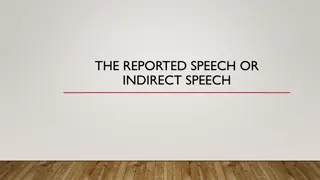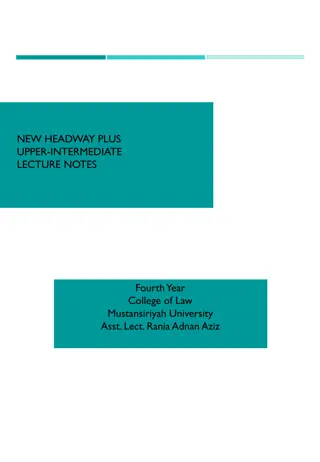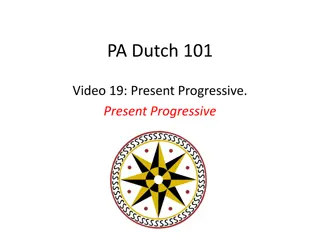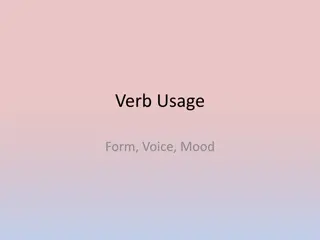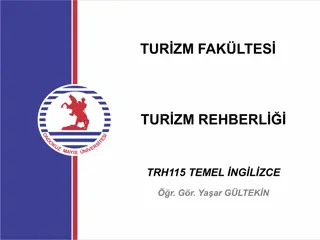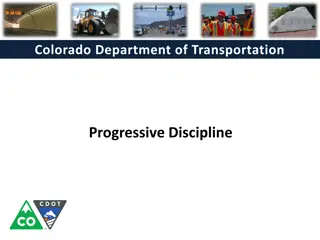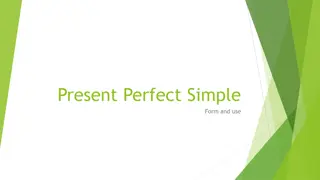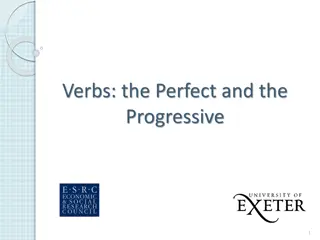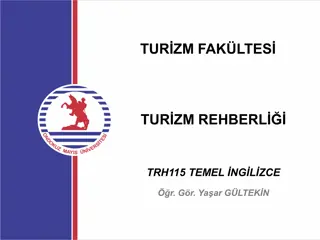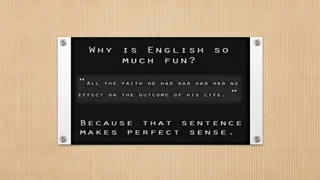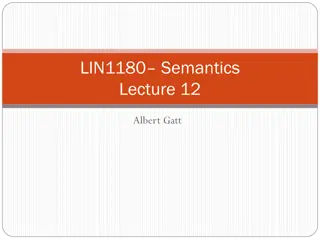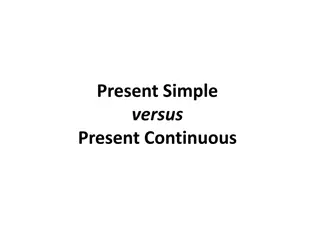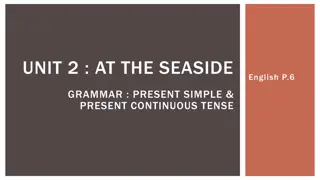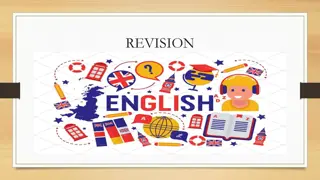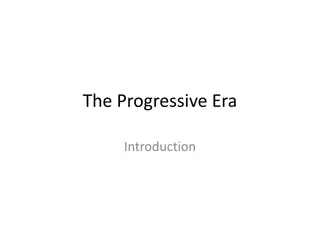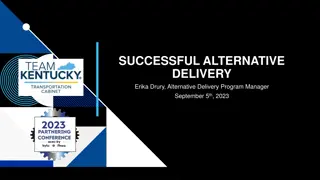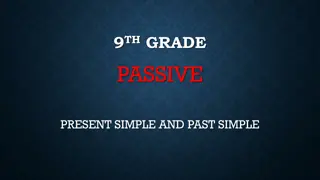
English Tenses and Usage Examples
Learn about the 12 basic English tenses including the simple past, present, and future, as well as how to use them in sentences. Practice exercises to understand the simple present and present progressive tenses.
Download Presentation

Please find below an Image/Link to download the presentation.
The content on the website is provided AS IS for your information and personal use only. It may not be sold, licensed, or shared on other websites without obtaining consent from the author. If you encounter any issues during the download, it is possible that the publisher has removed the file from their server.
You are allowed to download the files provided on this website for personal or commercial use, subject to the condition that they are used lawfully. All files are the property of their respective owners.
The content on the website is provided AS IS for your information and personal use only. It may not be sold, licensed, or shared on other websites without obtaining consent from the author.
E N D
Presentation Transcript
The 12 Basic English The 12 Basic English Tenses Tenses Simple Past Simple Past I did Past Past Progressive Progressive I was doing Past Perfect Past Perfect I had done Past Perfect Past Perfect Progressive I had been doing Simple Future Simple Future I will do Future Future Progressive Progressive I will be doing Future Perfect Future Perfect I will have done Future Perfect Future Perfect Progressive Progressive I will have been doing Simple Present Simple Present I do Present Present Progressive Progressive I am doing Present Perfect Present Perfect I have done Present Perfect Present Perfect Progressive Progressive I have been doing Progressive
Simple Present The simple present says that something was true in the past, is true in the present, and will be true in the future. It expresses general statements of fact general statements of fact and general truths general truths. Water consists The average person breathes The world is is round consists of hydrogen and oxygen breathes 21,600 times a day The simple present is used to express habitual or everyday activities habitual or everyday activities. I get get up at seven every morning I always eat eat a salad for lunch
Present Progressive The present progressive expresses an activity that is in progress at the moment of speaking speaking. in progress at the moment of The students are sitting are sitting at their desks right now. The present progressive is a temporary activity that began in the past, is continuing at present, and will probably end at some point in the future. I need an umbrella because it is raining I am taking I am taking five courses this semester. it is raining.
Simple Present and Present Progressive Simple Present Simple Present now past XXXXXXXXXXXXXXXX XXXXXXXXXXXXXXXX future Present Progressive Present Progressive X X X X start --------------------------------------- in progress now finish?
Exercises Complete the sentences. Use the simple present or the present progressive of the verbs in parentheses: 1) a. Kristin is in the shower. She (wash) ___________________ her hair. b. Kristin (wash) ________________ her hair every other day or so. 2) a. Tony usually (sit) _________________ in the front row during class. b. Today he (sit) ____________________ in the last row. 3) a. Andrew (work) __________________ the night shifts on weekends. b. He s not home now. He (work) _____________________ a double shift. 4) a. After six days of rain, I m glad that the sun (shine) ____________________. b. Every morning, the sun (shine) ______________ in my bedroom window and (wake) ________________ me up. 5) a. Babies (grow) ________________ very quickly. Newborn babies are very different from three-month olds. b. Your baby (grow) ________________ so fast. She isn t a newborn anymore! 6) a. Please, be quiet. I (try) _____________ to concentrate on my math homework. b. Each day, our math teacher (try) ______________ to explain the material clearly, but I am very confused.
Simple Present and Present Progressive: affirmative, negative, question forms Simple Present Simple Present I h help elp You, We, They help help He/She/It helps helps I do not h help elp You, We, They do not help help He/She/It does not help help Do I help? help? Do you, we, they help? help? Present Progressive Present Progressive I am helping am helping You, We, they are helping helping He/She/It is helping helping I am not helping not helping You, We, they are not helping are not helping He/She/It is not helping helping AFFIRMATIVE AFFIRMATIVE are is NEGATIVE NEGATIVE am is not QUESTION QUESTION Am I helping? helping? Are you, we, they helping? helping?
Exercises Complete the sentences with Do Do, Does Does, Is Is or Are Are On an airplane 1. ________________ you ready for takeoff? 2. ________________ the plane taking off soon? 3. ________________ you nervous? 4. ________________ you have your seat belt on? 5. ________________ the seats comfortable? 6. ________________ your seat comfortable? 7. ________________ the seat go back more? 8. ________________ they serve food on this flight? 9. ________________ the movie beginning? 10.________________ you like to fly? 11.________________ the co-pilot flying the plane? 12.________________ the co-pilot sleep during the flight? 13.________________ the pilots sleep during the flight? 14.________________ the plane on autopilot?
Verbs not usually used in the progressive (stative verbs) Some verbs like know They describe states, not actions, and are rarely used in progressive tenses. States are conditions or situations that exist. know are stative or non-progressive. Ex. I know know your cousin. Common verbs that are usually non Common verbs that are usually non- -progressive progressive Know Like Dislike Belong Consist of Contain Hear Agree Believe Appreciate Fear Possess Sound Disagree Doubt Care about Please Hate Own Mean Recognize Mind Exist Seem Promise Remember Prefer Desire Matter Look like Amaze Suppose Need Resemble Surprise Understand Want Wish
Stative verbs that can be used in progressive tenses Some verbs like think I think think that your cousin is very nice (think = believe) I m thinking m thinking about my trip to Rome (am thinking = thoughts are going around in my mind right now) Common Common verbs with both non verbs with both non- -progressive and progressive meanings progressive and progressive meanings Look It looks looks cold outside Appear Jack appears appears to be tired today Think I think think that Mr. Smith is a good teacher Feel I feel feel that Mr. Smith is a good teacher Have I have have a bike See Do you see see that bird? Taste The soup tastes tastes salty Smell Something smells smells bad. What is it? Love John loves loves his baby daughter think have both non-progressive and and progressive meanings. Amy is looking is looking out of the window She s appearing s appearing on a TV show today I m thinking m thinking about my family right now I m feeling m feeling a little tired today I m having m having a good time The doctor is seeing The chef is tasting is tasting the soup Ann is smelling is smelling her new perfume John is enjoying parenthood. He s loving it! is seeing a patient right now s loving

